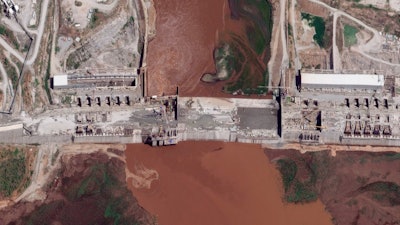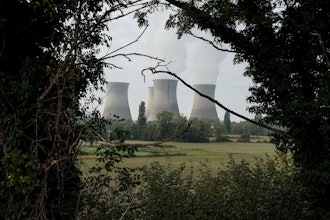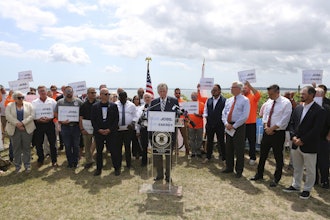
CAIRO (AP) — The leaders of Egypt, Sudan and Ethiopia agreed late Friday to return to talks aimed at reaching an accord over the filling of Ethiopia’s new hydroelectric dam on the Blue Nile, according to statements from the three nations.
Early Saturday, Seleshi Bekele, Ethiopia’s water and energy minister, confirmed that the countries had decided during an African Union summit to restart stalled negotiations and finalize an agreement over the contentious mega-project within two to three weeks, with support from the AU.
The announcement was a modest reprieve from weeks of bellicose rhetoric and escalating tensions over the $4.6 billion Grand Ethiopian Renaissance Dam, which Ethiopia had vowed to start filling at the start of the rainy season in July.
Egypt and Sudan said Ethiopia would refrain from filling the dam next month until the countries reached a deal. Ethiopia did not comment explicitly on the start of the filling period.
Ethiopia has hinged its development ambitions on the colossal dam, describing it as a crucial lifeline to bring millions out of poverty.
Egypt, which relies on the Nile for more than 90% of its water supplies and already faces high water stress, fears a devastating impact on its booming population of 100 million. Sudan, which also depends on the Nile for water, has played a key role in bringing the two sides together after the collapse of U.S.-mediated talks in February.
Just last week, Ethiopian Foreign Minister Gedu Andargachew warned that his country could begin filling the dam’s reservoir unilaterally, after the latest round of talks with Egypt and Sudan failed to reach an accord governing how the dam will be filled and operated.
After an AU video conference chaired by South Africa late Friday, Egyptian President Abdel Fattah el-Sissi said that “all parties” had pledged not to take “any unilateral action” by filling the dam without a final agreement, said Bassam Radi, Egypt’s presidency spokesman.
Sudanese Prime Minister Abdalla Hamdok also indicated the impasse between the Nile basin countries had eased, saying the nations had agreed to restart negotiations through a technical committee with the aim of finalizing a deal in two weeks. Ethiopia won’t fill the dam before inking the much-anticipated deal, Hamdok's statement added.
African Union Commission Chairman Moussa Faki Mahamat said the countries “agreed to an AU-led process to resolve outstanding issues," without elaborating.
Sticking points in the talks have been how much water Ethiopia will release downstream from the dam if a multi-year drought occurs and how Ethiopia, Egypt and Sudan will resolve any future disagreements.
Both Egypt and Sudan have appealed to the U.N. Security Council to intervene in the years-long dispute and help the countries avert a crisis. The council is set to hold a public meeting on the issue Monday.
Filling the dam without an agreement could bring the stand-off to a critical juncture. Both Egypt and Ethiopia have hinted at military steps to protect their interests, and experts fear a breakdown in talks could lead to open conflict.






















